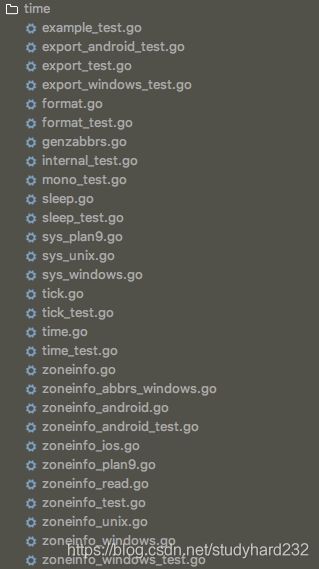Go语言time库的深入研究
先排除xxx_test.go文件,主要的文件为:
- time.go
- format.go
- zoneinfo.go
- sleep.go
- tick.go
其他的sys_xxx.go和zoneinfo_xxx.go都是zoneinfo.go的附庸,兼容不同平台打开$GOROOT/lib/time/zoneinfo.zip,进行指定时区的分析工作。
而sleep.go和tick.go,其实是time.Duration延伸的功能,主要服务于goroutine的工作,这里暂时不讨论这两个文件。
time.go, format.go, zoneinfo.go的主要可以的调用方法和简单解释如下:
package main
import (
"time"
"fmt"
"reflect"
)
func main() {
genUTCTime()
genUTCTime1()
parseTime()
parseDuration()
now := time.Now()
formatTime := timeStampFormat(now.UnixNano())
fmt.Println(formatTime)
fmt.Println(now)
fmt.Println(now.UnixNano()) // 生成时间戳19位
fmt.Println(now.UnixNano() / 1e6)
fmt.Println(now.Unix()) // 时间戳10位
// 生成两个时间的差值 :时间段
lastTime := time.Unix(0, 1550714939515549582)
dur := now.UTC().Sub(lastTime.UTC())
fmt.Printf("duration is: %v\n", dur)
fmt.Printf("duration to string is: %s\n", dur.String())
fmt.Printf("duration to Nanoseconds is: %v\n", dur.Nanoseconds())
fmt.Printf("duration to Seconds is: %v\n", dur.Seconds())
fmt.Printf("duration to Minutes is: %v\n", dur.Minutes())
fmt.Printf("duration to Hour is: %v\n", dur.Hours())
secondTime := time.Unix(0, 1550721050238199291)
dur1 := now.UTC().Sub(secondTime.UTC())
fmt.Printf("Second Duration is: %v\n", dur1)
fmt.Printf("duration to Truncate is: %v\n", dur.Truncate(dur1))
fmt.Printf("duration to Round is: %v\n", dur.Round(dur1))
// 给now时间加上一个时间段,得到一个新的时间
fur := now.Add(dur)
fmt.Println(fur)
// 比较两个time.Time格式的时间变量
boolEq := now.Equal(fur)
boolBe := now.Before(fur) // whether now is before fur
boolAf := now.After(fur) // whether now is after fur
fmt.Println(boolEq)
fmt.Println(boolBe)
fmt.Println(boolAf)
// 当前时间减去实参里的时间,得到的时间段
durSince := time.Since(secondTime) // 正数
durUntil := time.Until(secondTime) // 负数
fmt.Printf("Since the now is: %v, Until the now is: %v\n", durSince, durUntil)
// 给指定时间增加年、月、日
AddTime := now.AddDate(1, 2, 3)
fmt.Printf("AddDate to now is: %v\n", AddTime)
// 得到指定时间的年、月、日, 均为int类型
year, month, day := now.Date()
fmt.Printf("year: %d, month: %d, day: %d\n", year, month, day)
yearOnly := now.Year()
fmt.Printf("only year(int) is: %d\n", yearOnly)
monthOnly := now.Month().String()
fmt.Printf("only month(Month.String()) is: %s\n", monthOnly)
weekdayOnly := now.Weekday().String()
fmt.Printf("only weekday(Weekday.String()) is: %s\n", weekdayOnly)
dayOnly := now.Day()
fmt.Printf("only day(int) is: %d\n", dayOnly)
// 得到时、分、秒
hour, min, sec := now.Clock()
fmt.Printf("hour: %d, min: %d, sec: %d\n", hour, min, sec)
Hour := now.Hour()
fmt.Printf("Hour(int) is: %d\n", Hour)
Minute := now.Minute()
fmt.Printf("Minute(int) is: %d\n", Minute)
Second := now.Second()
fmt.Printf("Second(int) is: %d\n", Second)
Nanosecond := now.Nanosecond()
fmt.Printf("Nanosecond(int) is: %d\n", Nanosecond)
YearDay := now.YearDay()
fmt.Printf("YearDay(int) is: %d\n", YearDay)
// 序列化与反序列化
byteTime, err := secondTime.MarshalBinary()
if err != nil {
fmt.Println(err)
}
fmt.Printf("MarshalBinary the secondTime is: %v\n", byteTime)
tmpByteTime := time.Time{}
err = tmpByteTime.UnmarshalBinary(byteTime)
if err != nil {
fmt.Println(err)
}
fmt.Printf("UnmarshalBinary the secondTime is: %v\n", tmpByteTime)
jsonTime, err := secondTime.MarshalJSON()
if err != nil {
fmt.Println(err)
}
fmt.Printf("MarshalJSON the secondTime is: %v\n", jsonTime)
tmpJsonTime := time.Time{}
err = tmpJsonTime.UnmarshalJSON(jsonTime)
if err != nil {
fmt.Println(err)
}
fmt.Printf("UnmarshalJSON the secondTime is: %v\n", tmpJsonTime)
textTime, err := secondTime.MarshalText()
if err != nil {
fmt.Println(err)
}
fmt.Printf("MarshalText the secondTime is: %v\n", textTime)
tmpTextTime := time.Time{}
err = tmpJsonTime.UnmarshalText(textTime)
if err != nil {
fmt.Println(err)
}
fmt.Printf("UnmarshalText the secondTime is: %v\n", tmpTextTime)
mockTime := time.Date(1, 2, 3, 4, 5, 6, 7, now.Location())
fmt.Printf("mock a time follow local location is: %v\n", mockTime)
// Location from zoneinfo.go
location := now.Location()
fmt.Printf("Current location is: %v\n", location)
fmt.Printf("Current location(string) is: %s\n", location.String())
fixLocation := time.FixedZone("local", -8)
fmt.Printf("fixed the local zone is: %v\n", fixLocation)
}
func genUTCTime() {
now := time.Now().UTC()
UTCTimeFormat := now.Format("2006-01-02T15:04:05.000Z")
fmt.Println(UTCTimeFormat)
}
func genUTCTime1() {
now := time.Now()
// LoadLocation(),可以在"$GOROOT/lib/time/zoneinfo.zip"的解压后的文件夹中找到需要设置的时区
local, _ := time.LoadLocation("UTC") // "" "UTC" "Local" "America/Los_Angeles"
UTCTimeFormat := now.In(local).Format("2006-01-02T15:04:05.000Z")
fmt.Println(UTCTimeFormat)
}
// 格式化当前时间,并进行解析
func parseTime() {
now := time.Now().UTC()
UTCTimeFormat := now.Format("2006-01-02T15:04:05.000Z")
// 较之ParseInLocation(),没有指定时区,默认时区为"UTC"
parseResult, err := time.Parse("2006-01-02T15:04:05.000Z", UTCTimeFormat)
if err != nil {
fmt.Printf("parse the time has error is: %v\n", err)
}
fmt.Printf("the result of parse(UTC) is: %v\n", parseResult)
// 增加一个参数,时区
parseResult1, err := time.ParseInLocation("2006-01-02T15:04:05.000Z", UTCTimeFormat, time.Local)
if err != nil {
fmt.Printf("parse the time has error is: %v\n", err)
}
fmt.Printf("the result of parse(local) is: %v\n", parseResult1)
dateFormat := parseResult.Format("2006-01-02")
fmt.Printf("format the parsed result is: %s\n", dateFormat)
}
// 解析时间段
func parseDuration() {
strDuration := "2h49m39s"
duration, err := time.ParseDuration(strDuration)
if err != nil {
fmt.Printf("Parse the duration has error is: %v\n", err)
}
fmt.Printf("Parse the duration is: %v, its type is: %v\n", duration, reflect.TypeOf(duration))
}
func timeStampFormat(timestamp int64) string {
tm := time.Unix(0, timestamp).UTC()
UTCTimeFormat := tm.Format("2006-01-02T15:04:05.000Z")
return UTCTimeFormat
}
